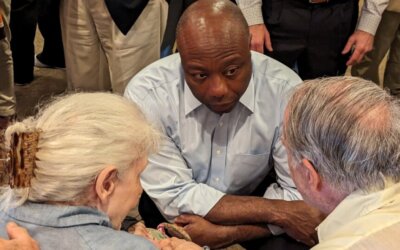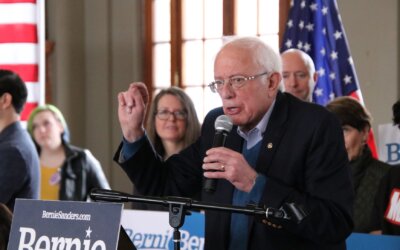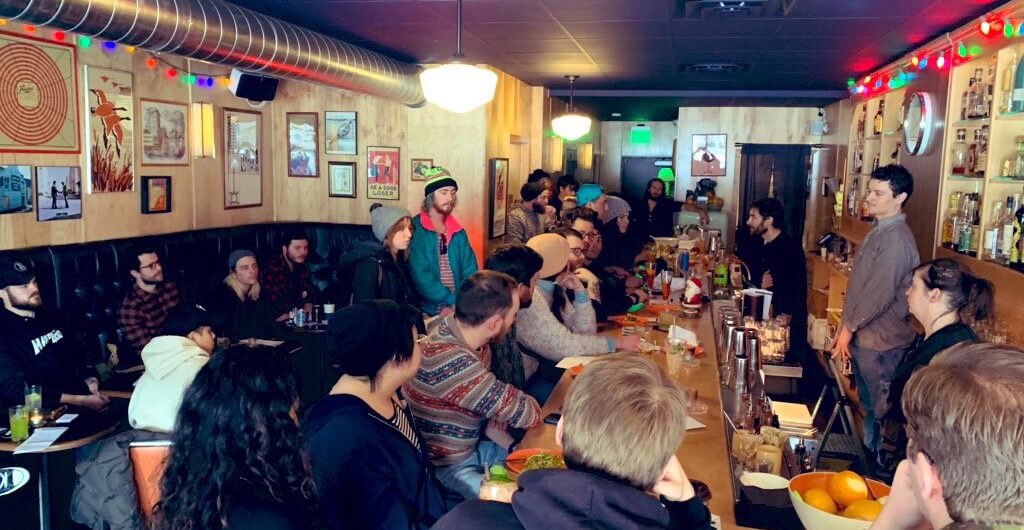
Photo: A Sanders service workers organizing meeting, via campaign
You can’t lead a working-class political revolution without working-class voters. And if Sen. Bernie Sanders prevails in the Iowa Caucus on Monday night, it’ll be in part thanks to thousands of baristas, cashiers, bartenders and restaurant servers standing in his corner.
For most of this caucus cycle, the Sanders campaign has been quietly organizing service industry workers, an untapped voting bloc of Americans that would likely stand to benefit the most from a Sanders presidency. The typically younger, online and over-worked workforce is perfectly primed for the message Sanders is offering; the trick is just getting them all out to caucus.
While Sanders himself has led several large rallies and marches in Iowa with striking fast food workers, the bigger, behind-the-scenes effort has been led in large part by service industry workers themselves.
Starting Line has found that Sanders’ Iowa campaign has hired many local service workers as field organizers over the past few months.
They include an Olive Garden server in Iowa City, a Bettendorf brewery worker, a North Liberty Hy-Vee clerk, an Iowa City cashier at Lowes, a St. Kilda’s bartender from Des Moines, an Ottumwa security guard and a records store worker from Sioux City.
[inline-ad id=”1″]
Many campaigns’ field teams are traditionally filled out in large part by recent college graduates trained in politics that get sent out to some far-flung town they’ve never visited to quickly immerse themselves in and organize the community.
Sanders’ approach starts local, attempting to turn service industry workers who have a wide personal network in their community into trained political organizers. Many of the potential local voters they know won’t ever show up in a VAN list (the party’s voter database), but a few Facebook messages to an old co-worker could turn into an one-on-one meeting and then a new, committed caucus-goer.
Both strategies are perfectly viable in building a strong campaign, but if Sanders is successful in this, it could be a model picked up by more Democratic campaigns in the future to mobilize these less-likely voters who lean left.
One of those Sanders organizers is Ben Mora, a 25-year-old who’s waited tables for ten years in Des Moines, most recently at St. Kilda’s. He volunteered for the campaign over the summer, then was officially hired in November.
[inline-ad id=”2″]
The first thing Mora talks to service industry workers about? Planning ahead.
“We tell people to email your boss right now and request Feb. 3rd off,” Mora told Starting Line in an interview. “It can be tough to get time off in the service industry, and what is the busiest time? Evenings, 6:30 to 8:30 p.m. That’s the caucus time.”
This is Mora’s first time doing political work, and possibly his only time, he noted. But he feels the Sanders campaign’s embrace of workers like himself reinforce the candidate’s larger message.
“I was hired directly out of the working class, because this is a movement of the working class,” he said. “They met me where I was, and I thought, if I’m going to be an organizer, I should do the same. I do have a lot of contacts in the service industry, so I went out and did that.”
[inline-ad id=”3″]
Mora said their worker outreach usually starts out with a volunteer or staffer going into a bar, cafe or restaurant and chatting up the employees, seeing who’s interested in Sanders and then following up. Mora noted that Eatery A in Des Moines has a lot of Sanders supporters working there, adding that it was perhaps because he and other Sanders staffers hung out there a lot anyway.
“It’s not off a targeted list or anything, we just go out, talk to whoever, and see where the support is at,” he explained.
In the Des Moines area, Mora has organized two service worker meetup events, drawing in about 90 people overall. There, they discussed their concerns over things like health care and wages, and how Sanders’ policies would address that. All of them were then tasked with reaching out to their personal network in the industry and recruiting others to go caucus.
One bartender volunteer canvassed various Des Moines establishments earlier this week, coming back 31 commit-to-caucus cards after just a few hours.
Starting Line reporter Josh Cook did the same over the past two weeks, dropping into various bars, restaurants, coffee shops and more in the greater Iowa City and Des Moines area to talk with employees about the caucus.
We found the same thing the campaign has: lots of younger service workers planning on caucusing for Sanders.
“I’m going to caucus for Bernie, probably, if I don’t have to work,” said Jackson, a server and bartender at a Hy-Vee Market Grill in Des Moines. “I do my best to stay on top of stuff politically, but it is tough working two jobs and doing so.”
[inline-ad id=”4″]
Abby, a barista at Java Joes in downtown Des Moines, also plans on caucusing for Sanders. So too does Sam, a host at Olive Garden in Iowa City. As will Adrianna, a barista at Graduate Coffee in Iowa City.
Others, like Daniel, a bartender and server at Fong’s Pizza in Des Moines, was deciding last week between Sanders and Elizabeth Warren. He couldn’t escape politics if he tried, as his restaurant has been a favorite hangout spot for campaigns.
“The campaign people are in here all the time. Cory Booker himself was in here while I was working,” Daniel said, but added that at some places, it’s better for workers to keep their political opinions to themselves. “At least half the bosses I’ve had in my life have been conservative, so generally I’m pretty quiet about this stuff at work.”
Baristas at popular coffee shops have seen a lot of campaign pitches over the last year.
“Oh yeah, people are in here all the time and they try to make their case to me in two minutes at the counter while they order and pay,” James, a barista at Smokey Row who hopes to caucus for Sanders, said. “It’s not the most effective, but I respect the effort.”
[inline-ad id=”0″]
Other restaurants have similar challenges when trying to discuss politics or campaigns.
“We generally try to shut that stuff down when people do come in here to canvass, we just don’t want our space to be like an advertisement for a particular candidate,” Molly, a bartender at the Royal Mile, said. “I do have a lot of the Bernie people in here because we’re so close to The Lift and [Vaudeville] Mews (two main Sanders staffer hangouts), but they’re usually not too bad about hounding me in the bar.”
The streets outside aren’t as safe.
“I do get a lot of it still, mostly when I go outside for a smoke,” she explained. “For whatever reason, I’ve had a lot of Pete people try to make their pitch when I’m out there.”
Even in the bars where the Sanders campaign staffers frequent most, it’s not all work.
“Yeah, they’re in here pretty regularly, but they’re usually in off-work mode when they come in,” said Tyler, a bartender at The Lift.
[signup_form]
And just because a campaign hires people from a private workplace doesn’t mean they’ll automatically bring every former coworker with them. The Sanders field organizers’ primary tasks remain the basic volunteer recruitment, door-knocking, texting and phone calling to lists of voters like any campaign.
A couple of the former coworkers who knew the newly-hired Sanders organizers in the Iowa City area hadn’t been contacted by the campaign, either in person at their workplace (some had rules against that) or personally through text or social media.
Also, just like any category of Iowans, service workers aren’t monolithic in their caucus choice.
Madi, a bartender at the Hessen House bar in downtown Des Moines, will be supporting Pete Buttigieg in the caucus.
“Ten years ago, I probably would have caucused for Bernie,” she explained. “But pragmatism plays a bigger role for me now.”
[inline-ad id=”5″]
She also hasn’t needed to leave her workplace to see the candidates.
“One time, Tom Steyer was in here while I was working,” Madi said. “He just came in and asked if he could go around and talk to the people who were eating their dinners.”
Eliza D’Anieri, 23, the general manager at the new Clyde’s restaurant in the East Village, will serve as a precinct captain for Elizabeth Warren, and she’s already been out knocking doors for the candidate.
“My sister’s boyfriend was volunteering for Elizabeth Warren, and he introduced me to one of the organizers, who happened to live in my apartment building,” she said. “I ended up meeting up with him during a grand opening … I have been super vocal about volunteering for Warren with my coworkers. For the most part, the people I know in the service industry either weren’t going to volunteer, or they already were for Bernie or Pete.”
[inline-ad id=”6″]
D’Anieri, who was worked at Scenic Route, St. Kilda’s and Eatery A, added that she was selected to be the local precinct captain in part because “my face is so well known, within the East Village, at least.”
And before caucus night comes, D’Anieri explained that people like herself could be uniquely positioned to win over caucus-goers for their candidates.
“I think there’s a part of being in the service industry that is secretly persuasive; you’re guiding people toward what they’re going to drink or eat,” she said. “It’s a lot more subtle than canvassing, but you have that practice of being able to explain why you feel certain ways about things.”
For Sanders, success on caucus night has always hinged on massive turnout of new caucus-goers, mobilizing a working-class base of support that sometimes hasn’t even voted in general elections, much less a caucus.
And if he pulls it off on Monday night, that could help his argument in later primary states on the thing so many Democratic voters are worried about this cycle: electability.
“It skews younger, it skews working class, of course, and often times these are people of color in the back and front of house,” Mora said of service workers. “That’s the exact makeup of our movement nationally; it’s a multiracial working-class movement.”
[inline-ad id=”7”]
A motivated, enthusiastic and engaged base like that, in some ways like the diverse Barack Obama coalition, could give Democrats the edge in a matchup with Trump.
“It shows that we practice what we preach, from the ground up,” Mora said. “I don’t have a degree. I was hired directly from the working class. When we say that we’re going to empower the working class, then we’re going to do that as a campaign. That’s how you create that lasting movement.”
by Pat Rynard and Josh Cook
Posted 2/1/20
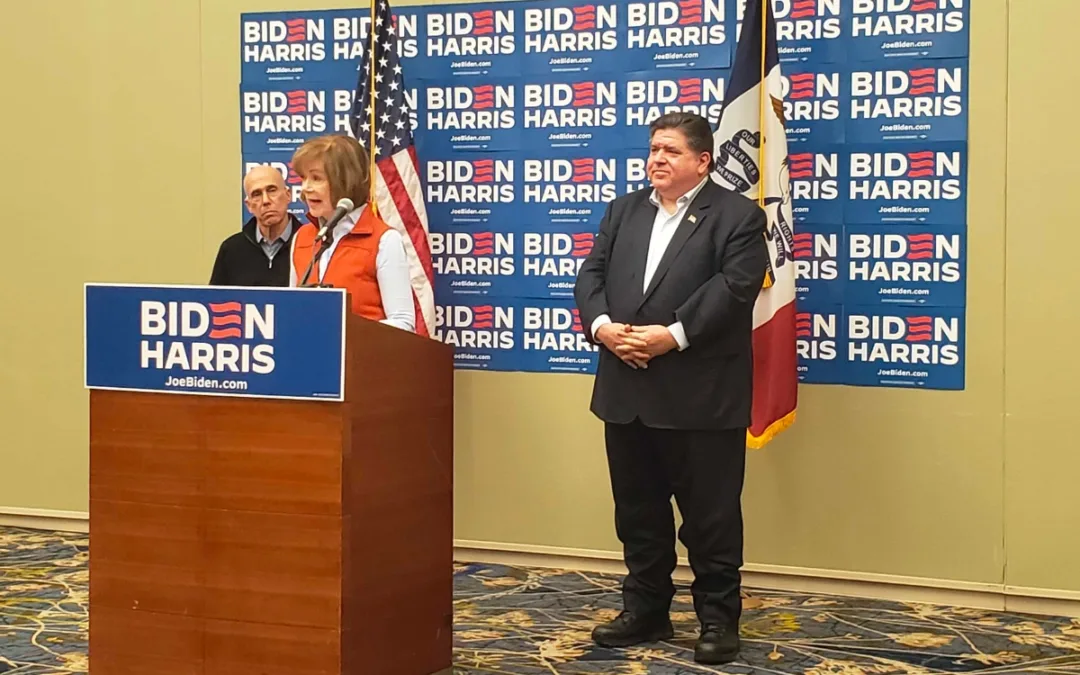
Original, heels or boots: Pritzker says leading Republicans are all MAGA
Illinois Gov. JB Pritzker said all three leading candidates in the Iowa GOP caucus—Donald Trump, Nikki Haley, and Ron DeSantis—represent the same...

Trump tells supporters it is worth dying to caucus for him
Former President Donald Trump continues to encourage his massive base to turn out in droves for him during Monday’s Republican caucus and told an...

Climate change protesters disrupt Ron DeSantis event
Climate protesters disrupted a Gov. Ron DeSantis campaign event in Ames on Thursday night. Three protesters were escorted out of the room at...

Evangelical leaders predict huge caucus turnout, downplay endorsements
Iowa caucus candidates have racked up big-name endorsements—including a notable last-minute flip flop—but one evangelical leader said none of that...
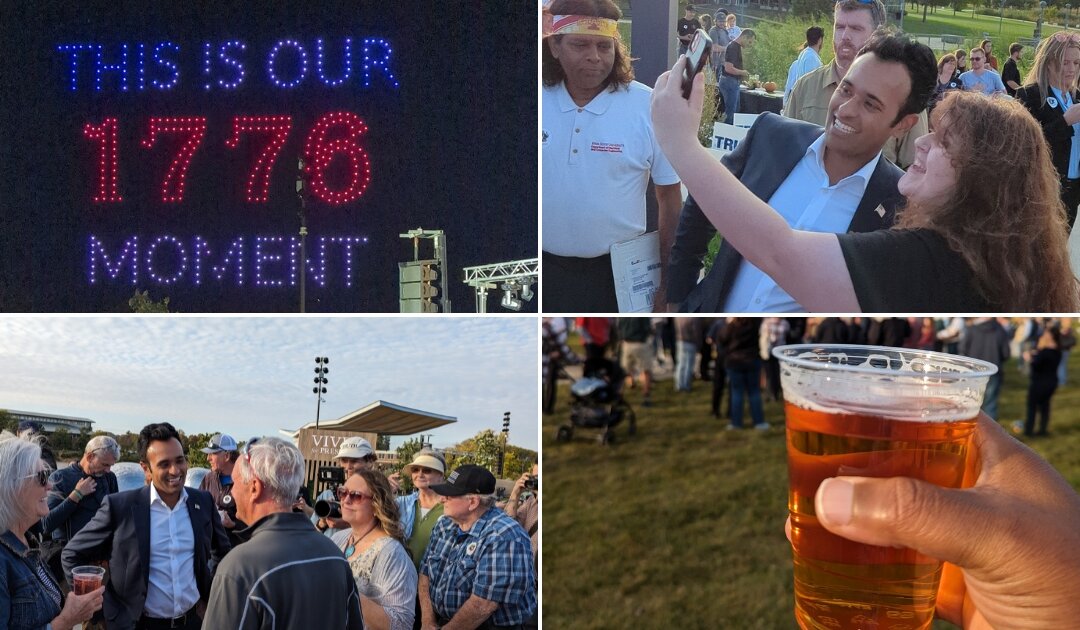
We went to Vivek Ramaswamy’s ‘Vektoberfest.’ Here’s what we saw
As I sat on a park bench eating a bacon-grilled cheese sandwich, drinking an Exile Ruthie straight from the tap, and chit-chatting with a few folks,...
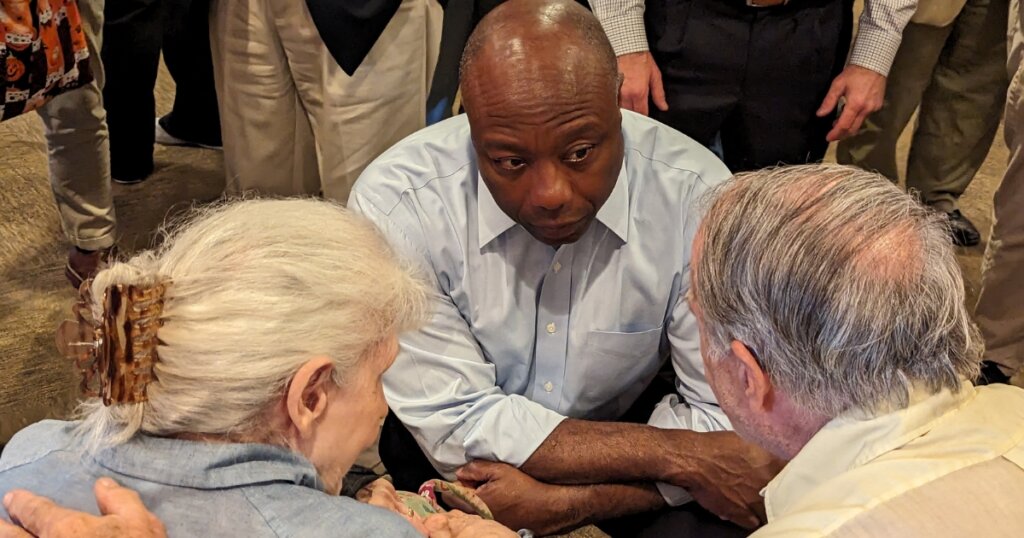
Tim Scott says kids need more exposure to conservatism
While many Republicans across the country have spent the last few years arguing that public schools are being used to indoctrinate kids into leftist...


